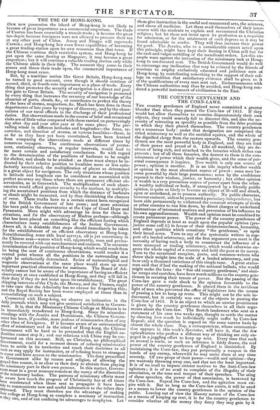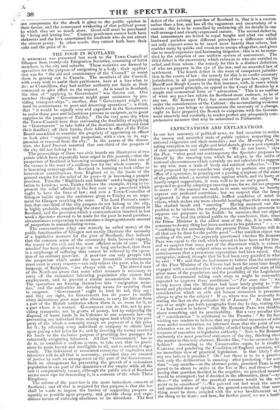THE COUNTRY GENTLEMEN AND THE CORN-LAWS.
Tam country gentlemen of England never committed a greater blunder than when they passed the Corn-law of 1815. If they would but allow themselves to examine dispassionately their own objects, they could scarcely fail to discover this, and also the ne- cessity of retreating as speedily as possible from the false position in which they then placed themselves. The country gentlemen are a numerous body : under that designation are comprised the titled aristocracy as well as the untitled squires, and the whole of the dignified clergy from the rectors upwards. The country gen- tlemen are the most powerful body in England, and they are fond of their power and proud of it. Like all mankind, they are de- sirous of being rich, and attached to the luxuries which riches can procure ; but of all these luxuries, the dearest to them is the con- sciousness of power which their wealth gives, and the sense of per- sonal consequence it inspires. Now wealth is only one source of power ; opinion is another. It is an idle inquiry whether wealth or opinion is the most abundant source of power : some men be- come powerful by their large possessions ; some by the confidence reposed in their wisdom, justice, or humanity ; but either opinion or wealth is a very precarious source of power apart from the other. A wealthy individual or body, if unsupported by a friendly public opinion, is quite as likely to become an object of and attack, open or underhand, as to possess authority. No public character, however eminent, unless he possessed a pecuniary independence, has been able permanently to withstand the constant attempts of rivals or other enemies to run him down, by direct charges or underhand insinuations of interested motives and perversion of his influence to his own aggrandizement. Wealth and opinion must be combined to create permanent power. The power of the country gentlemen of England depends at least as much upon the popular opinion (pre- judice some call it) in favour of their disinterestedness, humanity, and other qualities which constitute " the gentleman," as upon their broad acres. Turn to any of the systematic writers in sup- port of a landed aristocracy, and the first argument you meet is the necessity of having such a body to counteract the influence of a mere moneyed or trading aristocracy, which would otherwise en- gross the whole capital of a country and hold the poor at its mercy. Turn to the occasional essayists, poets, and romance-writers who throw their weight into the scale of a landed aristocracy, and you hear only a thousand variations of this simple tune. A great states- man said that if had the making of the national ballads, who would might make the laws : the " fine old country gentleman," and simi- lar scraps and snatches, have been worth millions to the country gen- tlemen in securing their tenure of power. But the passing of the Corn-law gave a rude shock to the opinion favourable to the power of the country gentlemen. It placed them in the invidious light of men who perverted the office of legislators into the means of passing a law to keep up rents. This might not be the sole in- ducement, but it certainly was one of the objects in passing the Corn-law of 1815. It is an object to which an unwise prominence is given by the country gentlemen themselves in all their argu- ments about the Corn-law. The Scotch landowner who sent us a statement of his case two weeks ago, thought to settle the matter by showing how much he individually might suffer by Corn-law Repeal; and the question is argued on the same narrow basis by almost the whole class. Nay, a correspondent, whose communica- tion appears in this week's Spectator, will have it, that the few agriculturists who profess a different way of thinking are only en- gaged in a juggling effort to keep up rent. Every time that such an avowal is made, or such an inference is fairly drawn, the real power of the country gentlemen of England is diminished. By maintaining the Corn-law, they put perpetually a weapon in the hands of any enemy, wherewith he may smite them at any time severely. Of two props of their power—wealth and opinion—they are wantonly throwing away one, and that not the least important. It is of no avail to impute sinister motives to the Anti-Corn-law agitators ; it is of no avail to complain of the illegality of their association, or the tone and temper of their speeches. The sting of these speeches, the power of that association, is bestowed by the Corn-law. Repeal the Corn-law, and the agitation must ex- pire with it. But so long as the Corn-law exists, it will be used as a means to lower the country gentlemen in the opinion of the public. Leaving out of view the illusory nature of the Corn-law as a means of keeping up rent, it is for the country gentlemen to consider whether all the money they fancy they may gain by it
oan compensate for the shock it gives to the public opinion in their favour, and the consequent weakening of that political power by which they set so much store. Good-will must be purchased by "living and letting live." Country gentlemen cannot both have reekrents and the love entertained for landlords who do not extort the utmost penny. In other words, they cannot both have their cake and the price of it.



























 Previous page
Previous page